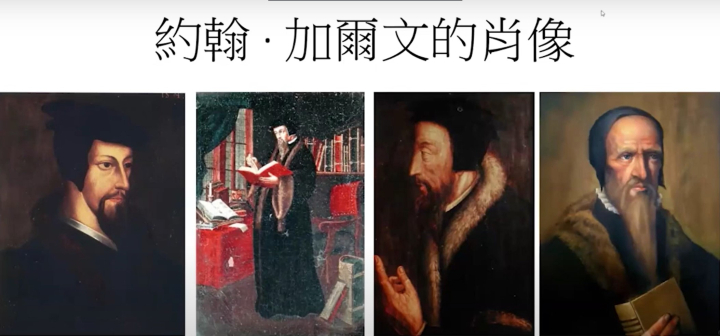
When people think of Calvin, they usually think of furrowed eyebrows. Long pointy nose, thick beard, stiff expression, no smiles, this is how Gary Brown depicts him. “But actually, he is human like us, with flesh and blood. He has his humanity and feelings.” Dr. Simon Wat said in his online lecture “Summary of Calvin’s Theology”. He led his audience to break the stereotypical image of Calvin and explore the multifacetedness of this spiritual giant.
The lecture is paraphrased below:

I’m not sure how well you know Calvin. Some people might have been a believer for some time already and heard many things about him, and maybe you would think that his serious image and doctrine of predestination makes him overly focused on the sovereignty of God which is why he seemingly ignores man’s choice and feelings. And maybe you’ve heard some stories of his life and came with some prejudices. Today, I hope to share with you another side of Calvin.
Unfortunately, when you search up Calvin online, most of the portraits we see have his brows deeply furrowed. Like this caricature by Gary Brown, Calvin is depicted with a long pointy nose, thick beard, stiff expression, and no smiles. This fits our stereotypical idea of Calvin, but in actuality, he is human just like us, with flesh and blood, with humanity and feelings.
In today’s lecture, we will not only discuss the characteristics of Calvin as a spiritual giant, I also hope that we can learn something new from his life experience, find something we don’t usually see.
Obeying His Father, Changing His Studies, Giving Up His Studies, Becoming a Shepherd
Calvin was born on July 10, 1509, in a small city in France. His mother died when he was just six years old, and had little influence on him. His father, on the other hand, had a profound effect on him. His father was the local bishop's clerk, a high position for the time, and had hoped that Calvin would follow in his footsteps. He wanted Calvin to become a member of the clergy, and perhaps even rise to the rank of bishop someday. However, his father changed his mind and instead encouraged Calvin to study law.
While in school, Calvin's studies were constantly changed. Although he majored in law, towards the end of his studies he wrote a commentary on the writings of the classical thinker Seneca, an attempt to become a prominent humanist. However, just as he was embarking on his scholarly journey, the Reformation (particularly the influence of Martin Luther) swept through Europe and reached France.
Calvin's close friend, Nicolas, was euthisatically pro-Reformation and gave a speech in Paris titled “Justification by Faith,” which caused great controversy. Nicolas was then hunted down as a heretic, and Calvin had to flee for being guilty by association. After being on the run for years, Calvin eventually arrived in Geneva, Switzerland.
Calvin’s original plan was to travel to Strasbourg on the French border, live in seclusion, and focus on scholarly research, away from the turbulences of the church. He was introverted and liked to read and write, it was only natural for him to desire so. However, while he was in Geneva, he caught the attention of another pastor, Farnolle. Farnolle saw in Calvin the leader Geneva desperately needed because he could speak powerfully and think meticulously.
Geneva had a large number of religious refugees who needed pastoral care, fleeing not from war or politics, but from the Catholic Church’s persecution. Yet Calvin hesitated. Farnoule’s counseling was direct: If you don’t stay to help and serve God, He will curse you. Perplexed by these words, Calvin put aside his academic dream and finally decided to stay in Geneva to minister to the local religious refugees.
Two years later, due to differences of opinion, Calvin left Geneva for Basel, Switzerland. Arriving in Strasbourg, he again encountered a similar scenario when another pastor, Martin Bussel, used a similar exhortation to ask Calvin to help the religious refugees there. Calvin eventually accepted the mission and continued to faithfully minister to those persecuted for their faith.
Calvin returned to Geneva in 1541, and although he did not receive citizenship of Geneva until 1559, he continued to minister faithfully until his deathbed.
The Four Stages of Faith: Ignorance, Shock, Exploration, Repentance
Calvin's journey of faith was full of challenges and changes. He went through four stages: ignorance, shock, discovery, and repentance, which together led him to a breakthrough in faith. The greatest shock in his life came when he introspected deeply and felt the rebuke of his conscience, he felt unworthy of salvation. This pain prompted him to ponder deeply about his faith. Eventually, he came to realize the significance of the Reformation. He agreed with the teachings of reformers such as Martin Luther and thoroughly criticized his life in Catholicism, repenting completely and accepting the doctrine of justification by faith.
Calvin’s life is a testament to how one can faithfully serve God and others through constant searching and repentance. The transformation Calvin went through is full of tears and gratitude, and it is something that every believer will experience when they break through in their faith.
Our faith is transformed not just emotionally, but also in our thinking and reasoning. Calvin’s transformation reflects this well. After he was converted, Calvin showed great faith and action in his Geneva ministry. His “Institutes of the Christian Religion” is not just a theological classic, but his magnum opus as well.
Calvin started with an academic pursuit, hoping to make a name for himself through the books and theses he would publish, but he had to change the direction of his life, choosing the path to serve God instead. However, even though he no longer pursued academic success, he did not let his writing talents rust. On the contrary, he used his writing to better serve and shepherd the flock God gave him. God will not waste the talents of the people He calls, but will creatively incorporate them into the services He calls them into. Writing, teaching, spreading the gospel, etc., all gifts will be used by God to bless many others.
Calvin’s writing career reflects how God helped him apply his writing talents. He continued to revise his “Institutes”, going until the fifth edition, demonstrating his commitment to excellence in ministry and writing. What we should glean from this lesson is that no service or work can be achieved overnight, but through constant practice and effort, we can do our best to reach perfection. We might be involved in Bible Study, choir leading, or other ministry works, but all first tries could be difficult. But through consistent practice and perseverance, we will come to the turning point of quality change, and even start teaching others ourselves.
If you consider Calvin’s “Institutes” a very important book, and even read it cover to cover in both Chinese and English editions, then you might feel great about yourself. After all, “Institutes” is a hefty book, and unless you are just skimming through it, you cannot finish the fifth edition in a year. However, what I can tell you is that, even if you thoroughly read “Institutes”, you have still only read a tenth of Calvin’s writings. His other works, including commentaries and psalms, take up a bulk of his portfolio.
Like many other Reformers, Calvin believed he had the responsibility to teach the Bible to the believers. That is why he wrote many commentary books. You will find that his Bible commentaries do not cover all 66 books of the Bible. For example, he did not write the book of Revelation because he wasn’t sure how he could comment on it, nor did he write anything for the wisdom books such as Proverbs and Song of Songs. Although he did not write commentaries on these volumes, he did often quote from the wisdom books in his sermons.
What is very precious about Calvin can be found in his introduction to his commentary on Thessalonians. He believes every full-time or part-time minister should realize that ministry is more precious than life. He critiqued the first half of his life with tears and felt God's grace to make ministry more than just work, but a response to God's salvation and love.
Many people, including my former theology professors, believe to preach well, you need to read Calvin's commentaries. Unfortunately, many of Calvin's commentaries are rarely translated into Chinese, the English translations are more complete. In addition to his commentaries, Calvin had many other writings. When he pastored in Geneva, he not only dealt with the separation of politics, society, and religion, but also wrote many creeds, organized the structure of the church, orders of worship, and children's education, and established a pastoral care system.
From “Institutes” to commentaries to other works of writing, we can see the dramatic change that Calvin went through. He went from a scholar to a pastor. He not only shepherded through his writing, he was also very active in promoting education.
Calvin the Workacholic?
Calvin is considered to be a workaholic. It is something interesting to think about as we end the lecture. Calvin’s life was completely devoted to responding to God’s salvation and to shepherding. During the Reformation, the Bible and theology were very important, but in cities like Geneva, the need for reading and education was just as important. Calvin realized the limitations of education at that time, and so started many high schools and higher education institutes. From 1550, he also held Bible classes every Friday evening. He did a great deal of teaching.
Calvin’s pastoral post didn’t just include the responsibility of teaching. He preached every Sunday, and while he was in Geneva, he traveled and preached in at least three places per week, sometimes multiple times per day. His sermon times were very early in the morning (4 AM to 5 AM), with slight modifications for summer and winter seasons.
Calvin preached constantly from 1542 to 1564. Thankfully God had someone record his sermons, otherwise, Calvin was known for his habit of preaching script-free. He believed doing so would allow the Holy Spirit to work without restraint. He would often schedule prayer meetings on Wednesdays, which is why until now many churches keep that tradition.
Before he died, Calvin gathered his fellow ministers and exhorted them to keep serving the Lord with fervor, not losing heart or courage. He hoped that they would continue to face the challenges ahead of them with bravery, not letting anything get between their relationship with the sheep of their flock. In his last words, Calvin expressed his gratitude to his coworkers, and asked for their forgiveness for any hurt he had caused them while serving together.
Calvin’s legacy is not just in his writings and preaching, but also in how insistent he was about spiritual life. His life teaches us that, true spiritual examples do not require us to follow every detail he did, but to learn from his characteristics and combine it with our individual abilities and situations to serve better. Calvin often felt in debt to God, which is why he was always improving his work, revealing great resilience and sacrifice through his dedication. His lie reminds us to genuinely give ourselves to God. That is how our serving and life can be transformed.














